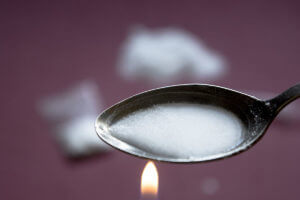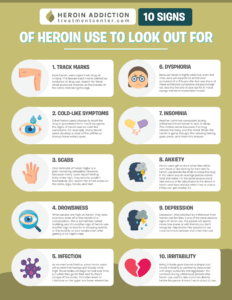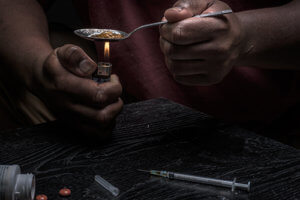Heroin users are 6 to 20 times more likely to die than the average person. And that risk increases with each time an addict uses.
Kicking a heroin habit is no small fete. The withdrawal symptoms are rough, and the cravings worse. Heroin addicts can feel utterly alone with their addiction, especially after alienating themselves from friends and family.
But knowing the signs of heroin use can be the difference between life and death. Find out for sure if your loved one is using heroin with this guide. That way, you can intervene before they become another statistic.
Keep reading for 10 signs to look out for and what to expect if your loved one fails to seek heroin addiction treatment now.
10 Signs of Heroin Use to Look Out For
People start using heroin for many different reasons. One of the most common reasons heroin users cite, though, is to escape the pain of living in the real world. Heroin is that escape for them since this drug reduces feelings of grief and increases feelings of pleasure.
But these feel-good symptoms come alongside far more dangerous ones. Heroin depresses heart rate and breathing while inducing a sleepy, dream-like state. If too much heroin is consumed, asphyxiation or heart failure may occur.
Prolonged use of heroin has even more frightening symptoms like collapsed veins, heart infections, liver and kidney disease, pneumonia, sexual dysfunction, and loss of the menstrual cycle in women. In worse case scenarios, heroin use leads to death.
Don’t let your loved one’s addiction get that far.
If you catch their addiction early, there’s more of a chance for a full recovery. Here are the 10 behavioral and psychological signs of heroin use you need to keep an eye out for.
1. Track Marks
Most heroin users inject their drug of choice. This leaves track marks behind as evidence of drug use. Search for these small puncture wounds on the insides of the arms and along the legs.
2. Cold-Like Symptoms
Other heroin users choose to snort the drug in powdered form. You’ll recognize the signs of heroin use as cold-like symptoms. For example, many heroin users develop a case of the sniffles or always have watery eyes.
3. Scabs
One hallmark of heroin highs is a pain-numbing sensation. However, because many users report feeling itchy while high, they tend to scratch themselves raw. Search for small scabs on the arms, legs, hands, and feet.
4. Drowsiness
When people are high on heroin, they relax and may doze off in the middle of a conversation. This is sometimes called nodding, and it’s another sign of heroin use. Another sign to look for is drooping eyelids, or the inability to stay awake even after getting a full night’s rest.
5. Infection
As we mentioned before, some heroin users will scratch themselves until bloody while high. Those scabs will begin to heal over time, but when they go for their next fix, they’ll scrape off the scabs. This often leads to infections on the upper and lower extremities.
6. Dysphoria
Because heroin is highly addictive, even first time users will experience withdrawal symptoms 6 to 8 hours after last use. Many of these withdrawal symptoms are psychological. And the first one to look out for is mood swings that tend toward bad moods.
7. Insomnia
Another common complaint during withdrawal from heroin is lack of sleep. This makes sense because the drug relaxes the body and the mind. When the heroin is gone, though, this relaxing feeling goes away, and insomnia ensues.
8. Anxiety
Heroin users get anxious when they either can’t have or are waiting for their next fix. Heroin use rewires the brain to crave the drug in the same way an average person craves food and water. For the same reason you’d feel anxious while dehydrated in the desert, a heroin user feels anxious when they’re unsure if they can get another hit.
9. Depression
Depression characterized by withdrawal from friends and families is one of the most obvious signs of heroin use. The person will spend more time alone, or with friends, you don’t recognize. Depression-like symptoms are most common between the times they use.
10. Irritability
Being irritable goes beyond a simple bad mood. Irritability is commonly associated with angry outbursts and aggression. It’s common during withdrawal periods after heroin use, and it’s also common directly before the person knows they’re about to use.
What Happens When Heroin Abuse Symptoms aren’t Treated?
Heroin is a highly addictive drug. And that means there’s a fine line between using and abusing it. If you know someone using heroin frequently, consider seeking help from an addiction treatment center Austin TX trusts.
Addiction to heroin is one of the most devastating conditions in the country right now. And that’s because it’s easy to overdose on this potent drug accidentally.

Fortunately, there are heroin addiction treatment centers that can help you overcome your addiction. But you need to seek help now– before it’s too late.
Seek Treatment for Your Heroin Addiction Now
Are you or a loved one showing one or more of these signs of heroin use? Learn more about the heroin addiction treatment center available to you on our blog. Check-in at a heroin rehab center today and discover what it’s like to live a happy, drug-free life.

 People most commonly inject heroin. Look for track marks on the inside of the arms but also along the legs. Some people snort the drug. They frequently present with cold-like symptoms such as a runny nose.
People most commonly inject heroin. Look for track marks on the inside of the arms but also along the legs. Some people snort the drug. They frequently present with cold-like symptoms such as a runny nose.




